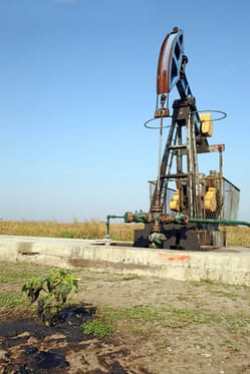Oil Drilling in West Virginia: A Call for Safety First to Prevent Workplace Injuries
Since the 1700’s the Appalachian Basin has been a known source of crude oil trapped deep in layers of black shale. Energy prospectors are seeing new potential for oil drilling in the Appalachian Basin, particularly in Eastern Kentucky and Southern West Virginia.
 New developments in horizontal drilling and hydraulic fracturing (fracking) have made previously inaccessible pockets of oil and gas deposits in shale formations accessible and potentially profitable. As the industry expands, the number of workers needed to accomplish this extraction is expected to increase exponentially, creating new opportunities and new revenue for the communities of Southern West Virginia.
New developments in horizontal drilling and hydraulic fracturing (fracking) have made previously inaccessible pockets of oil and gas deposits in shale formations accessible and potentially profitable. As the industry expands, the number of workers needed to accomplish this extraction is expected to increase exponentially, creating new opportunities and new revenue for the communities of Southern West Virginia.
Thousands of new jobs have already been created for West Virginians, and there will be at least 7,000 new West Virginia jobs created due to the impact of the development of the oil and gas industry including rig hands, roughnecks, engineers, as well as opportunities for contractors who serve the industry through drilling, pipeline construction, well service, trucking, and oil field service and supply.
According to Cunningham Energy based in Charleston, WV, this is an exciting time for the energy industry in West Virginia. The Appalachian Basin is one of the least explored potential sources for oil, and there is a good possibility that 90% of the oil available has not yet been tapped. The use of hydraulic fracturing for oil extraction has the potential of infusing millions of dollars into local communities. Cunningham Energy’s company belief is, “The best infield drilling opportunities come to light through reworking older wells that offset new drilling prospects.”
The mountains of Appalachia were the focus of oil drilling early in our country’s history, but the formidable mountain terrain made extraction of this oil labor intensive, limited, and expensive. Now, however, these new drilling techniques have allowed drillers to tap oil over a much larger area from a single well, and companies are beginning to pump oil out of the mountains once again. An increased number of operators are drilling or investigating drilling horizontal laterals in old open-hole vertical wells as well as newly-drilled wells, reentering and reworking older proven wells that have been abandoned by previous operators.
These modern day prospectors believe West Virginia offers unrivaled potential for oil production, and could be a key player in pushing the United States to first place for world-wide oil and natural gas production, strengthening not only our state’s economy, but also our national security.
Right now, the focus of oil drilling in West Virginia centers on Clay, Kanawha, Doddridge, and Roane Counties, but the West Virginia Geological survey maps of West Virginia indicate the majority of known oil fields are in the northern portion of the state in Monongalia, Marion, Tucker, Taylor, Harrison, and Wetzel counties.
Few in Southern West Virginia would dispute that this potential economic boom coupled with an influx of new jobs for this challenged area of the state will be more than welcome, but as the oil and gas industry grows, it is imperative that employee and community safety are the foremost considerations.
The downside of this new growth and opportunity lies in the danger these oil field workers face daily. A recent National Public Radio (NPR) report included these facts: “The fatality rate among oil and gas workers is now nearly eight times higher than the all-industry rate of 3.2 deaths for every 100,000 workers.
The spike in deaths may reflect the inexperience of the workforce, as well as worker exhaustion and other factors, experts say.
“During times of high demand like now, there are new workers brought into this industry, and these are workers that may not have relevant training and experience,” says Ryan Hill, who heads the oil and gas extraction program at the Centers for Disease Control and Prevention’s National Institute for Occupational Safety and Health. “They didn’t grow up around the industry, especially in some of the newer oil fields.”
Hill says the tough working conditions add to the dangers.
“Workers in this industry typically work 12- to 14-hour shifts for a week or two consecutively. The type of work that workers do often requires performing repetitive and physical labor.”
Some dangers to these drilling industry workers include well pad explosions, fires, chemical burns, dangerous falls, objects falling on workers, head and brain injuries, back and spinal injuries, and broken or crushed hands, feet, and limbs.
According to the Center for Disease Control (CDC), “Motor vehicle crashes are the leading cause of fatality in the oil and gas extraction industry. They make up 29% of all fatalities in this industry. The majority of fatalities are workers from well servicing companies. These workers drive long distances on rural highways to travel to well sites.” Often these roads lack safety features such as firm shoulders and road side barriers. This not only puts the workers at risk, but also any other motorist on the road.
The fatality rate among oil and gas workers is nearly eight times the all-industry rate for workers. Accidents happen in dangerous industries, but many could have been prevented if more training has been accomplished, greater safety measures had been in place and enforced, and if workers had not been worked hours past the point of exhaustion. Since the severity and duration of workplace injuries which occur in the oil and gas industry are typically far worse than in other employment sectors, oil and gas drilling companies must be held accountable for doing everything within their power to prevent such accidents.
When proper training is not in place, proper safety measures are not enforced, equipment is not properly installed, maintained, and repaired, or communication is lacking, oil and gas well injuries and deaths will occur. Some dangers to these drilling industry workers include well pad explosions, fires, chemical burns, dangerous falls, objects falling on workers, head and brain injuries, back and spinal injuries, and broken or crushed hands, feet, and limbs.
In most cases, a worker who is injured on the job will be able to receive some benefits from a Worker’s Compensation claim. In West Virginia, if employer is found to have intentionally placed their employee in harm’s way, resulting in serious injury or death, that employee may qualify to file a claim against the employer’s insurance company. If the cause of a workplace injury was due to faulty equipment or a negligent contractor, that person may be entitled to seek additional monetary compensation from a third party.
As this industry increases exponentially in the next few years, these modern day prospectors in the oil and gas industry would do well to remember “Safety First” —not only for the safety of workers and the community at large, but also for their own bottom line. Even in this changing economy, an ounce of prevention is still worth a pound of cure.
Sources:
West Virginia Geological & Economic Survey (WVGES) Interactive Mapping, “West Virginia Oil and Natural Gas Wells,” 2014.
University of Kentucky, “Geology, Hydrocarbon Production, and Horizontal Drilling in the Upper Devonian Berea Sandstone, Eastern Kentucky: References and Data Resources” byDavid Harris, Kentucky Geological Survey, June 2013.
National Public Radio (NPR), “On-The-Job Deaths Spiking as Oil Drilling Quickly Expands” by Andrew Schneider and Marilyn Geewax, December 27, 2013.
Jeffery Robinette was admitted to practice law in 1991 and is licensed in all levels of state and federal trial courts in West Virginia. Mr. Robinette is also licensed in all state and federal appeals courts in West Virginia and the United States Supreme Court. As a National Board Certified Trial Attorney who has handled hundreds of motor vehicle, injury, and construction defect claims and a leading author on insurance claims settlement issues and difficulties in West Virginia, Jeff Robinette is uniquely qualified to represent your best interest.




